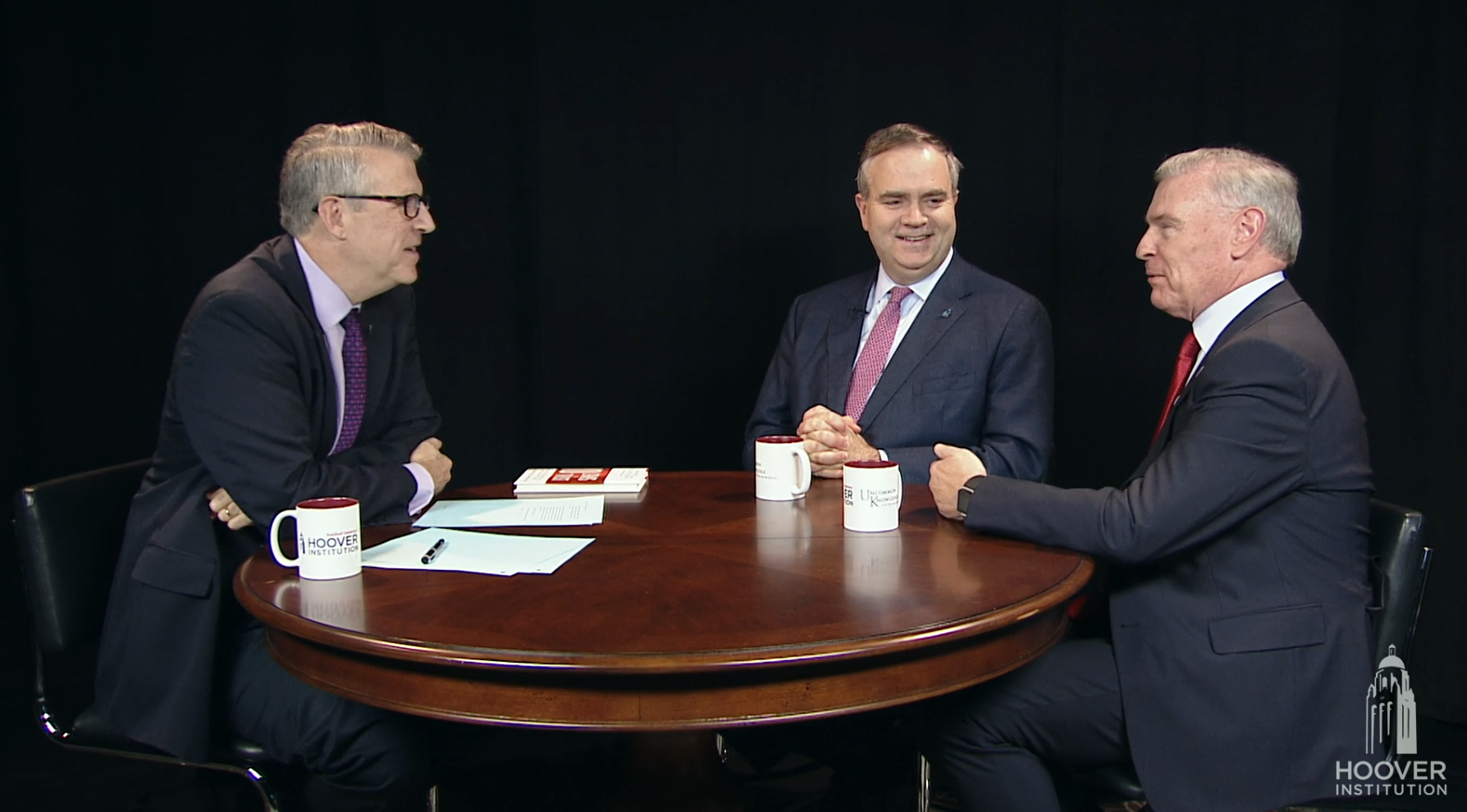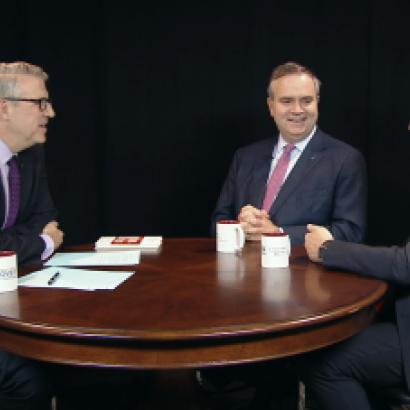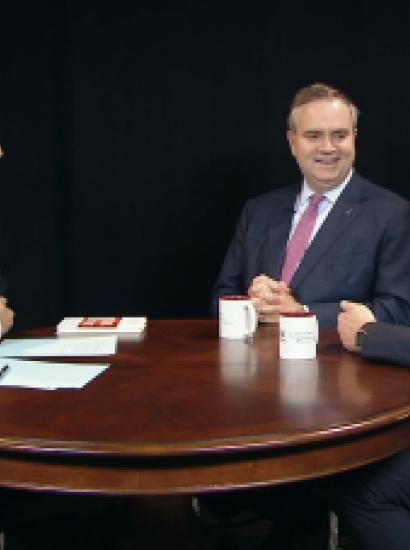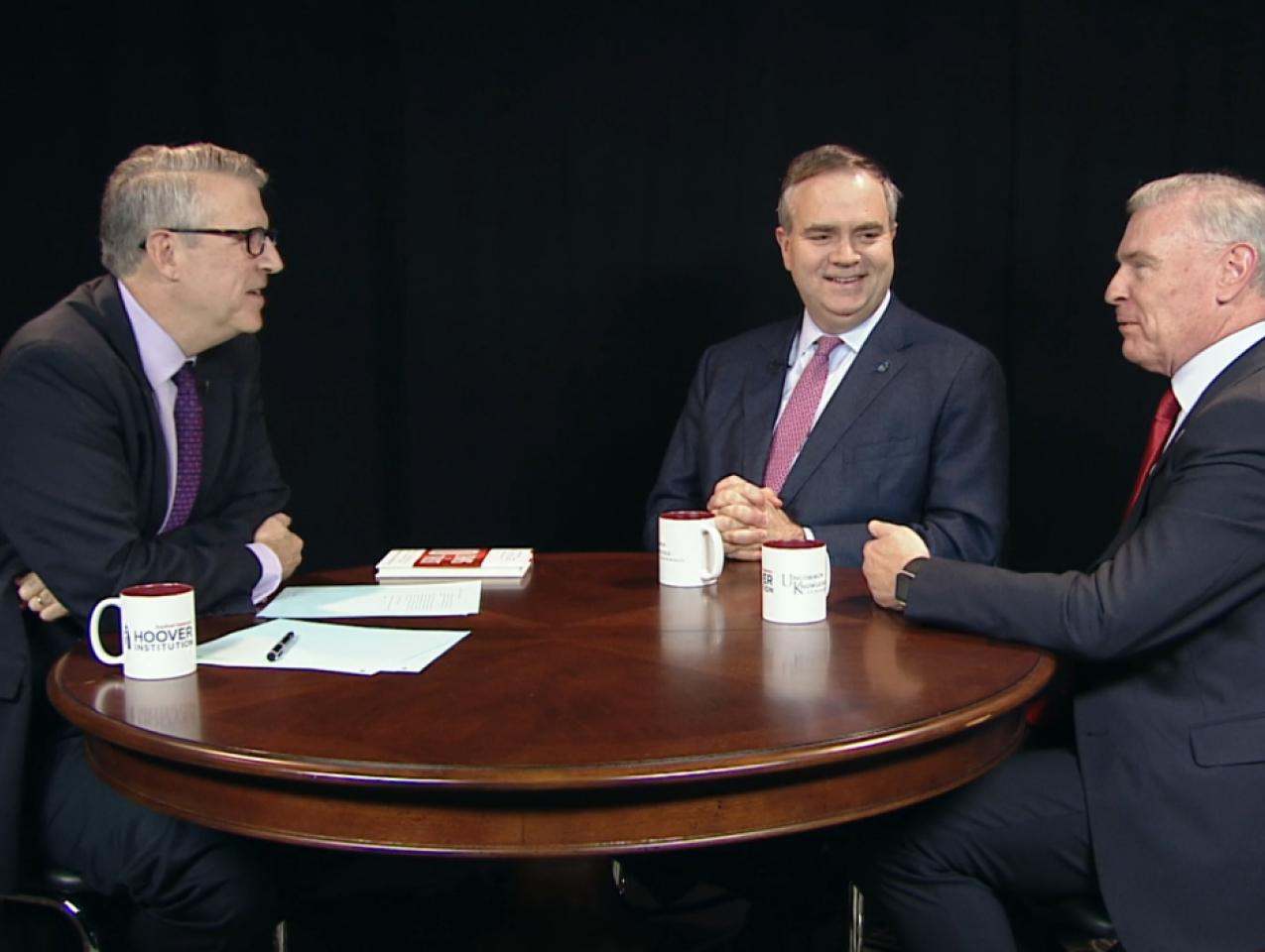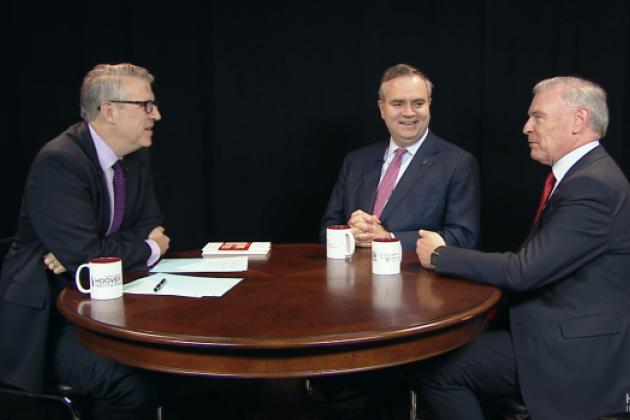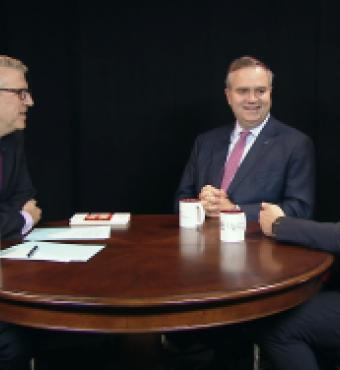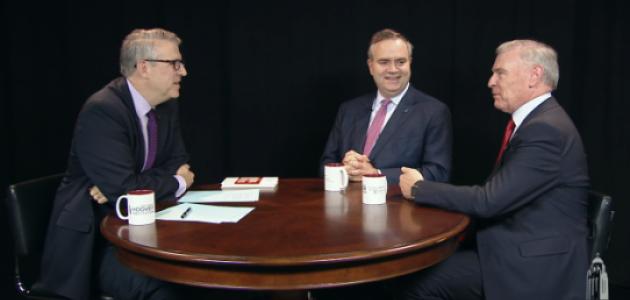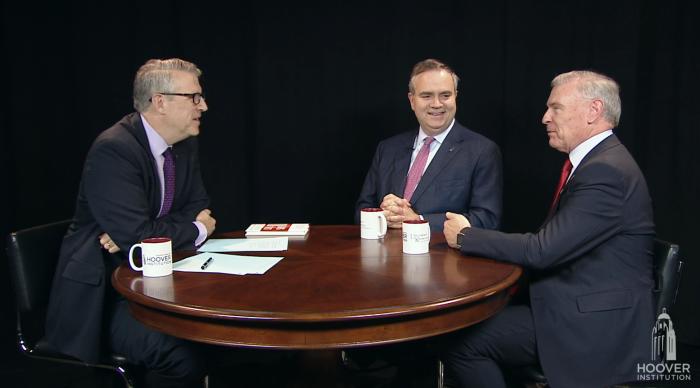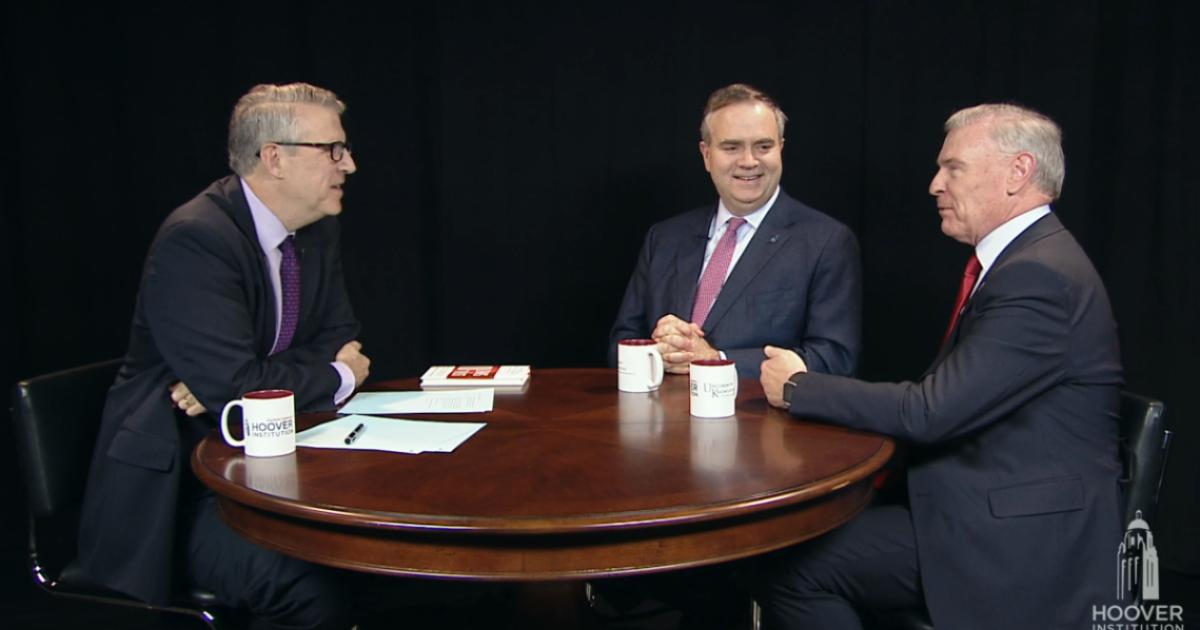Recorded on February 14, 2017
CEO Robin Hayes and Hoover Institution board member Joel Peterson talk to Peter Robinson about how JetBlue has remained successful, despite all the regulations, competition, and pitfalls of running an airline.
Peterson and Hayes argue that consolidation and the limited number of airlines in the United States have allowed for sustainable operating margins. JetBlue continues to have double-digit operating margins and great customer loyalty by focusing on safety, culture, and delighting customers. JetBlue has been voted best airline for customer satisfaction by JD Power for twelve years in a row.
Hayes and Peterson support the Federal Aviation Administration’s (FAA) managing the safety aspect of regulations, but they prefer that another independent entity run the operations aspect of the airline industry. Although the Airline Deregulation Act in 1978 deregulated the airline industry, the airlines are still one of the most regulated industries in the United States, with more than 13,000 pages of FAA regulations. Additionally, 21 percent of the cost of the air ticket goes to the government via taxes. Legacy airlines, like United, American, and Delta, will charge high fares until a new airline comes in; then the legacy airlines will lower their fares to try to drive out the new airline/entrant. You need a low-cost structure to compete, which JetBlue has; JetBlue has not had to go into debt to fund its airplanes.
They discuss how JetBlue has become synonymous with innovation and its decision to bring JetBlue’s investment arm to the Silicon Valley to further integrate disruptive technology into their airline. JetBlue, which wants to use technology to improve customer relations and track equipment, has invested in FLYR to study how the pricing method can be disruptive and thus improve ticketing.
JetBlue’s keys to success and longevity are a great culture, innovation, great products, and maintaining cost advantages. JetBlue seeks to create a culture in which all employees are empowered to improve customers’ experiences, from the time they check-in to the time they pick up their bags.
Full Transcript Below
Peter Robinson: Huge capital outlays, onerous regulations, unions, and the persistent risk that if something were to go wrong it could prove catastrophic. Why would anybody want to run an airline? With us today, two guests in a position to answer that question. Joel Peterson, the chairman, and Robin Hayes, the chief executive officer of JetBlue. Uncommon Knowledge now.
(Intro Music)
Peter Robinson: Welcome to Uncommon Knowledge. I'm Peter Robinson. A professor at Stanford Business School, the founder of Peterson Partners, a private equity group, and the former chief executive officer of Trammell Crow, the enormous real estate company, Joel Peterson has served as chairman of the board at JetBlue since 2008. He holds an undergraduate degree from BYU and an MBA from Harvard. Mr. Peterson recently published The 10 Laws of Trust: Building Bonds That Make a Business Great. Robin Hayes joined JetBlue in 2008. He has served as the company's chief executive officer since 2015. Before joining JetBlue, Mr. Hayes worked for 19 years with British Airways. He holds a bachelor of science and a master’s degree in engineering. Both from the University of Bath in England. Joel and Robin, welcome.
Robin Hayes: Thank you, Peter.
Joel Peterson: Nice to be here.
Peter Robinson: I want to know what the two of you think you're doing in the airline industry. First, I have with me a man who was in the White House when President Trump met airline executives. This is tricky because you're a publicly traded company but what did you think of the president?
Robin Hayes: Actually, it was very encouraging. We went in to talk about air traffic control reform, talk about the amount of regulation that airlines have to be on the receiving end of. Look, it was a very encouraging discussion. The president I think really understands aviation and was keen to hear how we felt that we could create an even stronger growth engine in the US.
Peter Robinson: President Trump at the White House meeting, I'm quoting from a press account, "We have an obsolete plan system, we have obsolete airports." Now as best I can tell, what he's getting at there is that air traffic control systems are still ground-based radar and that's a system the fundamentals of which date from the second World War. All of us carry iPhones in our pockets that use global positioning satellites, are much more accurate, but as I further understand transforming that system in airports across the nation from ground-based radar to GPS would be vastly expensive. Do you think he's serious?
Robin Hayes: I do. I think that the concept of reforming the air traffic control system, updating it, and operating it more efficiently actually goes back for 20 or 30 years.
Peter Robinson: Right. That's what people have been trying this for a long time.
Robin Hayes: Exactly. Most of the world has moved on and done this now and seen the benefits. I think there's really two parts. One is the technology has to be upgraded. Secondly, there has to be a more steady source of funding than being subject to Congressional budget cycles and sequestration. All the other things that the FAA had been through. JetBlue, like most of the airline industry, supports moving the operating part of the air traffic control system, put it into a not-for-profit entity, have a board represented by all the stakeholders, including airlines, labor, government, and run it independently.
Peter Robinson: Get it out from under the FAA?
Robin Hayes: Exactly. Let the FAA focus on their core regulatory function of safety. They do an amazing job and they should continue to regulate the industry from a safety perspective but let the operating part of that, let a different entity run that.
Peter Robinson: Okay. Joel Peterson, I happen to know something about you. You lecture at the business school on entrepreneurship.
Joel Peterson: Correct.
Peter Robinson: You have been there for a good long time now.
Joel Peterson: 25 years.
Peter Robinson: 25 years. A lot of your students have gone on to found companies. Bonobos, you were the first investor in Bonobos. You know a lot about the Silicon Valley model which is a small handful of bright kids, a million dollars at the most to get them started, a quick ramp and you've got a really valuable company. Okay, that's a model you understand. Now let me describe another model to you: the airline business. Billions on aircraft before you even get one off the ground. You're dealing with unionized labor, you have to submit to regulations. I read, who knows whether this is true or not, but I saw the other day that FAA regulations run to 13,000 pages. Again, you have to live with the knowledge that if anything goes wrong people could lose their ... If something goes wrong with Bonobos, my jeans don't fit. If something goes wrong with an aircraft, a large object holding people falls out of the sky. Add all that up and you've got Warren Buffet himself who famously called airlines, "A death trap for investors." Joel, what are you doing at JetBlue?
Joel Peterson: You have to remember, I was in the real estate business for many years.
Peter Robinson: This looks pretty good by comparison.
Joel Peterson: This looks pretty good. Real estate business is capital intensive, regulated, you have to lease it up all the time, it's cyclical, I think JetBlue had an opportunity to build a brand and to do something different. To innovate in a commodity business. That was exciting. I think we had a catchment area that was six million people out of JFK. We could fly port to port.
Peter Robinson: Started back east at JFK.
Joel Peterson: Started back east at JFK. We had a phenomenal entrepreneur, really a visionary entrepreneur.
Peter Robinson: The date of foundation of JetBlue is ... What was the year it was founded?
Joel Peterson: '99 I think.
Peter Robinson: You're the third CEO as I recall.
Robin Hayes: Correct. The first flight was in February 2000 but there was a year to 18 months’ work before that to get it ready.
Peter Robinson: All right. The opportunity with which the company began what was the business proposition that people talked themselves into believing when they invested in JetBlue?
Joel Peterson: I can speak to that because I was one of the original investors.
Peter Robinson: Oh, you were? I didn't know that. Oh, okay. Good. Yes, you can.
Joel Peterson: It was that we could provoke demand. That we weren't going to be just stealing customers from legacy carriers but that we could actually provoke demand by a new offering, by doing something different, and that we could build a brand. We could build loyalty. We could do things differently from what was being done.
Peter Robinson: Okay. Robin, your turn. You have degrees in engineering. You could have done something with your life. You could have started a software company yourself. Instead, here you are, CEO of an airline. Before that, 19 years at BA, British Airways. What was it?
Robin Hayes: I'd always loved airplanes and when I left university to do my first job I worked for an avionics company. We manufactured military avionics equipment. I was playing around with airplanes then.
Peter Robinson: Really, this all goes back to a boyish romance with flying?
Robin Hayes: Well, yeah. Interestingly enough, I didn't take my first flight until I was 18 years old. We lived in England and we vacationed usually very domestically. I was very late taking my first flight but I always loved airplanes, loved being around them, and still do. I don't know what else I would do. I'm certainly not an academic. I love airplanes, Peter.
Peter Robinson: All right. You've given me a rough description of what the two of you are doing. One more question, I want to talk about the business, the way you think about the business, from an investor's point of view today your stock is trading at about $20 a share. Maybe a little under $20 a share today. There was a high of about $27 in 2015 I think and a low of about $13 in the summer of 2016 if I'm remembering the high and the low correctly. Market cap at a little over $6 billion. What kind of investor should want JetBlue in his portfolio? What does JetBlue do for a portfolio?
Joel Peterson: Go ahead, Robin.
Robin Hayes: Well, I think we very much historically have been a growth company. Joel is right. If you think about the early days, JetBlue was still all about stimulating demand and creating new markets and we've continued to do that. I think that whilst we have different investors in our shareholder mix we have some very long-term shareholders who have been with us for a while and been on that journey for us. I think one of the changes we've seen in the US for the last few years is how really airlines have gone ... There's been so much consolidation, there's so few airlines left, that I remember 15 years ago when early on in my career, you would dream of making a 10% operating margin.
Peter Robinson: Those were marginalized years.
Robin Hayes: Our margin we closed with 2016 was just under 20%.
Peter Robinson: Oh, wow. Okay, sorry.
Robin Hayes: The industry average was around 17%, 18%. You can see that in the US, the rest of the world, different story. When I think about the US industry and JetBlue in particular there's a very sustainable long-term business model that even now in the toughest of years and in the economic down cycles is still capable of producing double digit operating margins.
Peter Robinson: Your pitch to investors is still, at this stage in the company's life, it is not, "We're a coupon. We'll give you a steady ..." Your pitch to investors is still pretty simple, "Go long, JetBlue, this is still a growth company." I've got that?
Joel Peterson: Right.
Peter Robinson: Okay. Robin Hayes, in an interview last August, "We have amazing customer loyalty." That's quantifiable. Is it?
Robin Hayes: Yes.
Peter Robinson: Okay, prove it to me. Go ahead.
Robin Hayes: Well, we measure customer loyalty in a number of ways. I think that we are seen as a very early innovator of customer NPS, net promoter score, so we serve a large number of customers on all aspects of their journey. We continue to win every single year. We've now won JD Power Best Airline for Customer Satisfaction in North America for 12 years in a row.
Peter Robinson: That's staggering. That's staggering.
Robin Hayes: I think one of the best things when I joined JetBlue and you sort of put that JetBlue ... You take the BA ID off and you put the JetBlue ID on, people stop you on the street and say, "I just love JetBlue." We know we're not perfect but when we get it wrong we try and make it right quickly.
Peter Robinson: Joel, here's an airline analyst. I found this online. A fellow called Harley Manning. He's quoted last year in the Business Insider, "JetBlue is full of personality, with a little attitude in a nice way." I have to say, that's the way I feel JetBlue has personality. Listen to those words, personality, attitude, niceness. You are flying large tin cans in the sky. There are only a couple suppliers. Everybody buys their airplanes from Boeing or as you do from Airbus. There are only so many routes. You fly the same routes as your competitors. You are dealing with the same unions as your competitors. You are under the same regulations. How do you achieve ...Yet, you've got this brand that people love enough to fly JetBlue over your competitors whenever they can. Analysts, who are supposed to be the hard boiled people on Wall Street talk about niceness and personality. How do you do that?
Joel Peterson: Well, I think that says a lot about the experience that most people have on airlines. It's not great.
Peter Robinson: Horrible.
Joel Peterson: Yeah, so JetBlue really tries hard. We try harder. The old Avis thing. We really try. I think the other thing is we have a culture. An internal culture. It was Peter Drucker who said, "Culture eats strategy for breakfast." The power of culture is really strong. People like each other, the board likes management, management likes the board, we solve problems. I think the other element is that we have innovated. JetBlue has done a lot of innovation.
Peter Robinson: Innovative where ... Give me a few examples. You mean innovated in the customer experience?
Joel Peterson: Yes.
Peter Robinson: You're designing comfortable seats and giving free WiFi. That kind of thing?
Joel Peterson: WiFi. I think the TVs in the seat backs probably had the biggest impact. I have a lot of friends who will come to me and say, "I won't fly anything else because my kids ..." This used to be, "Want to see the TVs in the seat backs." I think there's a lot of things like that.
Peter Robinson: Describe culture to me. Here you are, CEO. There's only one of you. Chairman, there's only one of you. You employ about 20,000 people. That's the correct number in round numbers?
Robin Hayes: We just had our 20,000th crew member join a few weeks ago.
Peter Robinson: Okay, so you employ 20,000 people. How do you achieve quality control, so to speak, across human beings? How do you extend that culture across a workforce that large?
Joel Peterson: Let me just tell a story on Robin. Robin sits back with the passengers that are flying in the second cabin and he helps clean the plane. He serves snacks. He talks to customers. That rubs off on flight attendants, on pilots. There's this sense that we're all crew members. At JetBlue we don't talk about employees. People are crew members. There's an executive crew. There's tech ops. Everybody is a crew member. There's this sense that our job is, number one, safety. Number two is to delight customers. We train people to delight customers. That's different.
Robin Hayes: Yeah, I think it starts on the first day. David Neeleman who was the founder of JetBlue, brilliant entrepreneur, and then Dave Barger, who was the second CEO, another great leader. Dave hired me. It all starts on the first day. Every single new JetBlue crew member on their first day of employment will be down at JetBlue university in Orlando and their first session, their first module, is with the CEO of the company. That's where we meet all of our new teams for the first time. There will be a whole team of leaders that come through that day. That very much sets the tone because that's where we can talk about the importance of culture. What we say to our crew members is if we take care of you, you'll take care of the customers and it's as simple as that. David Neeleman used to coin the phrase that we're a customer service company that happens to fly airplanes. Finally, I would say, Peter, that it's about giving our people the tools to do the job. We invested last year in putting all of our US-based airport crew members through hospitality training. Three days of hospitality training per crew member.
Peter Robinson: Which is expensive.
Robin Hayes: Which is a big investment but it gives them the tools. We can't just have these expectations of our crew members and each other if we don't equip them for success. We've been able to see that and we've been able to see where that's taken off and where we've had to go back and do a little bit more work. The crew members have been really thankful for some of those basic training tools.
Peter Robinson: Okay. Business minds at work. Let's do case studies. You're a business school man. Let's do a couple of case studies drawn from the recent history of JetBlue and I would just like to hear how you thought through the business problem. Spring of last year you attempted to purchase Virgin America and in the end you got outbid by Alaska Airlines. Why did you want Virgin in the first place? Why did you permit yourselves to be outbid? Who do I go with on this one?
Robin Hayes: Maybe I'll start and then Joel ...
Joel Peterson: I'll correct him.
Robin Hayes: Joel can correct me. Ever since the first day of JetBlue we've been very much focused on organic growth because we see culture ... We don't have the network of the big legacy airlines.
Peter Robinson: You're the fifth-largest airline.
Robin Hayes: Well, we were but now we're the sixth.
Peter Robinson: Oh, because of this deal.
Robin Hayes: Because of this deal. Culture really is what makes customers choose us even when they could fly with somebody else. It's our people. We've already been focused on organic growth. When the Virgin opportunity came up, the first thing we asked ourselves was, "Culturally, can we make this work?" We don't want to destroy our culture just to acquire another airline. I think we felt as a leadership team and as a board that there was a good culture fit between the two organizations.
Peter Robinson: If anybody would describe another airline as having personality it would have been Virgin Airlines.
Robin Hayes: Exactly. We had differences but we felt that we could be better together. The second thing it accomplished for us was booting our west coast presence. With our mint premium experience, we don't call it first class.
Peter Robinson: We'll come to that.
Robin Hayes: We've built a stronger presence on transcon. This would have helped us and it would have built our inter-west presence as well. That's why we wanted Virgin America. I'll let Joel tell you why ...
Peter Robinson: Why did you decide you didn't want it quite that much?
Joel Peterson: It was a question of economics. In the end, we set a price and said this is our walk away price. We may have inched a bit at the end but really we were bumping up against what we thought the value was. I think Alaska paid a full price.
Robin Hayes: Yeah, this was a stock that was trading in the twenties.
Peter Robinson: Virgin?
Robin Hayes: Yeah. The company was sold for 57. We got to a point where we felt that it was a better option to build our plan organically.
Joel Peterson: It'll take us longer.
Robin Hayes: It'll take us longer but, again, last June we purchased an additional 30 airplanes.
Peter Robinson: Which is a capital outlay of?
Robin Hayes: About one and a half billion dollars to two billion depending on ...
Joel Peterson: That's over time.
Robin Hayes: It's over time. Yeah, it's over time.
Peter Robinson: You never really spent it.
Robin Hayes: By the way, Peter, back to my point earlier about the health's industry, ever single airplane we took delivery of last year we paid with cash. We haven't been into the debt markets for nearly three years now to finance airplanes. It's a very healthy company that is able to pay for its own growth.
Peter Robinson: All right. Mint. Not long after losing the Virgin deal to Alaska, JetBlue began its new Mint service. This is lie-flat seats. Then more personal service in that forward cabin. Something like this might have seemed obvious for other airlines, upgrade first class. For you, it was a large departure because JetBlue had a strong emphasis on egalitarian experience. There was no such thing as first class or business class in JetBlue. It was just JetBlue from one end of the aircraft to the other. Question, how controversial was installing what is ... I know you don't call it first class but laymen would call it first class. How controversial was it on the board? Within the c-suite in your headquarters in Long Island City? How controversial was this? How hard a decision?
Robin Hayes: Maybe I'll start and then Joel can give the board perspective. First of all, it was very controversial internally.
Peter Robinson: Was this your idea? Now that it's worked out ...
Robin Hayes: Success has many fathers but failure never does.
Joel Peterson: Robin was an initial champion, though. He was an early champion.
Robin Hayes: We got there because we were looking at our performance as a company. We had a real challenge on the transcon routes, the east to west coast, because we were suffering a significant unit revenue disadvantage versus everyone else. We really had two paths. Either to pull down the lot of that flying and focus it in north or south or secondly find a way of winning in that market. The reason we went with the second is that more north/south was fine but again ...
Peter Robinson: When you say more north/south you mean that ...
Robin Hayes: Northeast to Florida.
Peter Robinson: You're big in the Caribbean.
Robin Hayes: We were already really strong there. Part of what a growing airline has to do as you get big is to diversify. As a leadership team, we came up with this concept of how we felt we could win in the premium segment. We wanted to set ourselves the challenge of offering the best product at a price point that really was lower. The large airlines were gouging customers with very high fares and poor service back then. We came up with the Mint concept. It was controversial. We had heaps of meetings internally. A lot of concern around the culture and what it would do. How our customers would react to that. In the end, we got there by saying, "You know what? If we can make the experience in Mint amazing but also improve it for all of our other customers on the airplane who aren't flying Mint then everyone wins." That's exactly what we did. Joel, your take on the board? We had some fairly heated board discussions, right?
Joel Peterson: The board was divided on it. By the way, I've been on 35 boards ...
Peter Robinson: Your whole competitive advantage is your culture.
Joel Peterson: Yeah.
Peter Robinson: This is something that was messing with the culture or could have. This is a big deal.
Robin Hayes: Yeah, it's a business decision.
Joel Peterson: I actually think conflict is a healthy thing. I really think you get to better decisions. The board is highly respectful of each other and of management. There were debates. Robin actually mocked up the seating and as a board we sat in the seats. Different pitch seats. I remember that. People said, "This won't work. This is too tight." He was really playing more with the core product. Just to say, "Can we ... "
Peter Robinson: The core product meaning what a layman would call the economy seating?
Joel Peterson: Yes, exactly.
Peter Robinson: You were serious about trying to improve that at the same time that you installed ...
Robin Hayes: We did. If you go on the 321's that have Mint and you go to the core product, we have a great seat. We have 100 channels of live TV. We now have free movies you can start and stop. We introduced drinks and a food pantry where customers could go and help themselves to soft drinks and snacks.
Peter Robinson: Oh, really?
Robin Hayes: That wasn't just the exclusive purview of the business class customer or, as we say, the Mint customer. It was for everybody. It gave us the opportunity to improve the experience for everybody on the airplane.
Peter Robinson: Okay. Last of these case study questions here. I want to see how your minds work on these questions. You're not an ultra-discounter. You're not competing with Southwest. Yet, at the same time, although you're very strong on the east coast and Caribbean you're just now building out the transcontinental west coast to east coast. Can't fly JetBlue to Europe, can't fly JetBlue to Asia. You're not competing with the long haul gigantic network operations. Well, I shouldn't say you're not competing with them but you're smaller. You're neither one thing nor the other. Ultra-discounter, gigantic worldwide networks, and here's JetBlue. Are you happy there? Is that tenable to be in the middle?
Robin Hayes: I absolutely do. It's funny. We've demonstrated, actually, I believe that when you create an airline that's focused on culture and the customer you can drive superior returns for your owners and shareholders. I think last year was a great example where we outperformed the vast majority of the industry and yet we experience the highest levels of customer satisfaction. Our own crew members voted us as one of the top 10 companies to work for in America on the Forbes top 500. I think we are doing it. Now we don't obviously have the network or the large legacies but we have a ...
Peter Robinson: But you want them, don't you?
Robin Hayes: We've only been around 17 years. Every year we're growing a little bit. Southwest, which is a great airline, Southwest have been around now for over 45 years. It just takes time to build that.
Peter Robinson: Whenever Robin comes in and says to the board, "Ladies and gentlemen, we have an opportunity to add some routes here" is there a culture test that the board imposes? It would seem to me that this culture that you've built, where again I go back to personality and attitude and niceness, and airline travel is in general so miserable that if you find something that's pleasant ...Okay, fine. I've made that point. It has to be related or at least it could be related to size. You can get too big to be able to do what you guys do well. Is that right? Does the board worry about that constantly?
Joel Peterson: Well, I think you worry about the dilution of the culture and growing too fast and Robin gets pushback if he wants to go too far, too fast. He's very sensitized to this kind of thing so it's not a big fight. It's just major growth. The question is can you have pricing power? Is this really a commodity business? That really the flight that is $3 cheaper is going to get the customers? I think it's really more than that. I think it's a question of frequency, convenience, the airport, the status of the planes, how you're treated getting on, how fast you can check in. There's a whole what we call the JetBlue experience. We want the JetBlue experience to have people say, "I'm loyal to this. I'll fly JetBlue."
Peter Robinson: JetBlue and Silicon Valley. Transportation is a sector in Silicon Valley. We know the trucking industry ... If you're Fred Smith at FedEx, you are thinking hard right now about the driverless revolution that is coming at you. Or if you're at Ford. Ford just spent a billion dollars to acquire an artificial intelligence company. They have an office here in Silicon Valley that employs I think it's something like 300. It's a pretty big presence out here. Apple and Google are both building their own driverless cars. That's ground transportation. JetBlue last year set up its own operation, its own investment entity, JetBlue Technology Ventures, here in Silicon Valley. The day after tomorrow you two fellows are having a board meeting here. Silicon Valley is important to you and I want to know why. What disruptions do you see coming?
Joel Peterson: As an investor, I look at tech-enabled businesses that are existing businesses. Where they're not new technologies that are starting some whole new field. Those exist out there. We're a large industry. Tech-enabling that industry ... Robin talked about the ATC, the technology improvements that can happen there, but in everything, in checking in, in maintenance, there's all kinds of things where you can improve operations through technology. We want to be at the cutting edge of all that. We want to know everything that is going on.
Peter Robinson: Your attitude, your approach to Silicon Valley is not ... I don't know what the Ford executives are thinking but let's say if you're running a car company you could say to yourself, "Oh my goodness. They're coming for us. We need to be out there if only as a matter of self-defense." You're not thinking that way? You're thinking there are all kinds of incremental ways in which we can purchase or at least expose ourselves to technology to do what we do now, better. Is that correct?
Robin Hayes: I think it's primarily what Joel said. It's funny. I'll tell a Joel story now. Joel is obviously the cutting edge at Stanford and so he used to send me all these smart people with these ideas and he used to send it to me. I used to send it to my team and not much would happen with it. The reason not much would happen with it is the airline was so busy, when we got these things we were looking at it through a very traditional lens, and it wasn't set up for some more innovative thinking.
Peter Robinson: You're busy with airplanes in the air.
Robin Hayes: Yeah, busy with airplanes. No one is thinking about, "Let's invest in this business and how do we use it?" The primary goal of setting up tech ventures was really now we have a footprint here in this amazing, innovative technology landscape and we are getting run over in the crowd by all these things, all these ideas, that now are coming into our airline that we're already seeing ways we can become more efficient and more productive and more innovative.
Peter Robinson: Can you name an example? Or is it still too tentative?
Robin Hayes: No, no, happy to name examples. Using new technology in our contact centers to help us interact with customers in their chosen means, whether it's social media, a phone call, email. Looking at how ...
Peter Robinson: You mean, if I called JetBlue it is not your aim to keep me on hold until I finally give up?
Robin Hayes: Why did you have to call? Why can't you contact us how you want to? We're looking at new ways of tracking ground equipment in the airport. It's making sure we know where different bits of equipment are. Very important from a safety perspective that you know equipment has not been blown out or hasn't been chopped. Loads of examples. It's also I think a secondary objective is we've seen other parts of the travel sector, whether it's ground transportation or lodging, we've seen them significantly disrupted over the last five years by new entrants. A lot of airline experts will say, "That can't happen to us." You know, that's what the hotels said before Airbnb came along. We now have one foot in that camp. If the industry is going to be disrupted then we want to be a part of it. We've taken investment in a company called Flyr which is looking at how the pricing model can be disrupted for airlines. We're getting smart in that as well. We have a terrific leader in Bonny Simi and Raj who is there on the team. They're doing some amazing things.
Peter Robinson: Last couple of questions here, public policy. Robin was listening to the president earlier this week, President Trump, if you could ... Ah, forget about talking to President Trump. I think it may be hard to get his attention just at the moment. Chairman of JetBlue, here's an operation and you're running the operation. What are the public policy ...If you could tell the government of the United States how to make the airline industry better from the point of view ... Not the profitability of your investors, although I wouldn't denigrate that, but from the point of view of customers, people that are traveling from place to place. You must see things all the time that the government could do better. What would you say, Joel?
Joel Peterson: Well, I'd say air traffic control, which you've talked about.
Peter Robinson: In Britain what kind of air traffic control system do they have? Is it still ground-based radar?
Robin Hayes: It's a mix of ground-based and satellite.
Peter Robinson: So they're ahead of us?
Robin Hayes: Yeah, but it's operated from a different company outside of the government.
Peter Robinson: Okay, go ahead. Air traffic.
Joel Peterson: Yeah, I think open skies, treaties, that would give us a chance to fly to other countries. I think there's some limitations there on how open skies works. What else, Robin? In terms of government.
Peter Robinson: What would you add?
Robin Hayes: I would add deregulation. I do think that ...
Joel Peterson: We are a deregulated industry. We're the most deregulated regulated industry.
Robin Hayes: Look, I want to make it very clear. There is no push back at all from JetBlue or any airline at all on the safety regulation because we're very proud and the FAA should be very proud of what's been achieved in the US industry over the last 20, 30 years. It's world class. We have amazing air traffic controllers and pilots every day who operate in that system and tech ops, crew members. There's a lot of other regulation. For example, regulations that impose how airline can distribute the products and who you have to send in the distribution chain, travel agents direct, how you price it. Airlines have to include tax in the total whereas pretty much every other industry you buy your products and then the sales tax or the tax is added on top of that. Most people don't know that 21% of their air ticket goes to the government in tax. A family of five traveling on vacation, one of the tickets that you're buying is straight to the government. Money gets diverted out of aviation to close the budget surplus. Customers pay TSA fees.
Peter Robinson: You just mentioned the three letters that I was waiting for the two of you to mention. TSA. Wouldn't you love it if customers arrived at the gate a little happier? If they hadn't been patted down and made to stand ...
Robin Hayes: I actually think ...
Peter Robinson: Is there no way to do TSA better?
Robin Hayes: I actually think they've made huge improvements and huge strides. [inaudible 00:34:10] who was the previous administrator, who I knew well, I think did a great job with his team. The pre-check I think is a fantastic product for customers that go through it. I think they're very focused now on ... Every morning I now get a report of all the top airports in the country and how long the TSA waits were.
Peter Robinson: Oh, really?
Robin Hayes: We can then work with the TSA and that transparency wasn't there before. I actually think the TSA do a very difficult job. At the end of the day, their job is to keep us safe. They've done that.
Peter Robinson: Joel, if you could wave a wand and have it followed, this would happen, would you wave the wand? The question is Robin said leave safety with the FAA but air traffic control we can do a better job of that set up in an independent agency. Do you want TSA run by the federal government? Couldn't the airlines set up an independent agency that would do it more efficiently?
Joel Peterson: It's being done privately in some places. I think that option is being looked at. I think there's a number of things that are being looked at.
Peter Robinson: I just don't see any passion. You don't feel my pain as I go through TSA.
Robin Hayes: There is a program today where under the TSA model certain airports can be privatized. Have operators run it on behalf of the TSA. Most people don't know that because when you go through ...
Joel Peterson: Are they any better?
Robin Hayes: We don't see a difference.
Joel Peterson: I don't think we see any difference.
Robin Hayes: I think something like pre-check I think that's a terrific product for people who fly a lot. That really was a great partnership with TSA, customers, border protection, and I do worry that had you sort of a patchwork quilt of private operators I think that would be much harder to do.
Peter Robinson: All right. That's my pet peeve. Enough of that. Back to JetBlue. Back to JetBlue. Last couple questions here. Robin in an interview last year described the difference between British Airways, where he worked for 19 years, and JetBlue. "The biggest difference was that BA was an incumbent and so the whole mentality was around defending its strength. JetBlue is a challenger brand." How long can you keep it up?
Joel Peterson: I have to say that I invested in an airline that took BA on directly and Robin put us out of business.
Robin Hayes: That's not true. That was a very competitive industry.
Joel Peterson: He came up with the work around ...
Peter Robinson: You have crushed challengers in your past.
Joel Peterson: He understands how to win as an incumbent.
Peter Robinson: Isn't it just inherent that in time the longer you're in business, the more successful you are, the more you become an incumbent because the more you have to lose. How do you handle that as a business problem?
Joel Peterson: To me, it's a question of culture and innovation. If you can keep those two things alive. That's why I look at something like JetBlue Ventures where we just said, "We're going to remove it from New York. We have an airline to run there."
Peter Robinson: Your investment firm here in Silicon Valley.
Joel Peterson: Our investment firm here in Silicon Valley. We're going to innovate here. I think as you keep piloting, sun setting, hiring people that look at things differently you can continue to innovate for a long, long time. There's some very innovative companies that are fairly large.
Robin Hayes: I think we're about to undergo a digital eclipse here. We're thinking of JetBlue very much as how we want our digital brand presence to evolve over the next few years. We've actually again looked at how we were doing things and there's some great new space in a building called the New Lab in the Brooklyn Navy Yard in New York. We're moving our digital development team over there so we can really incubate a startup. It's different to tech ventures because that's more about outside in. This is how we innovate digitally within JetBlue. I think providing we can continue to innovate, providing we continue to remember that culture is what truly separates us, and also work very hard to maintain our cost advantage because that's the other thing. Part of how you can go in and grow and lower fares is if you have a cost structure advantage against your competitors. We started flying Boston to La Guardia on October 31st last year. Fares came down 70%. The market was stimulated to a massive fashion.
Peter Robinson: Overall fares? You drove the whole market down.
Robin Hayes: The World Cup fares came down 70% because what happens is legacy airlines, and there's only three of them left now, they will sit there, they will charge very high fares ...
Peter Robinson: United ...
Robin Hayes: United, American, and Delta.
Peter Robinson: Got it.
Robin Hayes: They will sit there, they will charge very high fares, and then what happens is when a new entrant comes in they will lower the fares to try and make life hard and drive the new entrants off. You need a low cost structure for that to happen. We've always done that. We've always been about lowering fares. Now you can fly between Boston and La Guardia, New York and Boston, much more cheaply. Providing we can continue to all of that ... First day of orientation, that's when I say to all our new crew members, "We'll be here in another 17 years providing we continue to have a great culture, innovate with great products, and maintain our cost advantage."
Peter Robinson: Okay. Speaking of innovation, you also flew the first regularly scheduled flight from Miami to Havana.
Robin Hayes: Fort Lauderdale to Havana. Close, Peter.
Peter Robinson: Thank you. You know, television business as long as you're in the general area.
Robin Hayes: August 31, 2016.
Peter Robinson: Why? Are you going to make money on that route?
Robin Hayes: We will eventually. The Dominican Republic is now so important to JetBlue. Cuba is going to take some time to ramp up. Our crew members wanted to be first.
Peter Robinson: All right. Last question. Joel, this is profound. Don't feel you have to answer without thinking it over first. Window or aisle?
Joel Peterson: If it's night, it's window. If it's day, it's the aisle.
Peter Robinson: Robin, window or aisle?
Robin Hayes: Aisle. I'm up and down the whole time so I can't be just walking over ...
Joel Peterson: Do you fly red eyes?
Robin Hayes: I do fly red eyes occasionally. I'm more of a daylight person.
Joel Peterson: Yeah, I fly more red eyes.
Peter Robinson: Joel Peterson, chairman of JetBlue, and the author of The 10 Laws of Trust, and Robin Hayes, chief executive officer of JetBlue. Thank you.
Robin Hayes: Thank you.
Joel Peterson: Thanks, Peter.
Peter Robinson: I'm Peter Robinson for the Hoover Institution and Uncommon Knowledge. Thank you.







